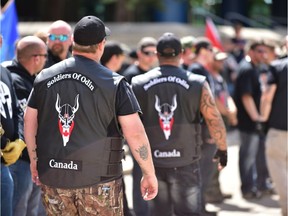Elise Stolte: Treating the 'tunnel vision' that causes hate and violence, no matter the colour

Article content
It’s an imaginary world, this black and white one — the one where a white race or Islamic faith is the source of all strength, where anyone not with you is against you.
Forensic psychologist Farzad Zare-Bawani calls it tunnel vision, a cloistered ideology, walled off from reason and reality. But those ideas are hard to walk away from.
“They need to overcome black and white thinking, slowly start looking at the world in shades of grey, which is not easy,” he says. “It takes that shine away from the world. Nothing seems to be pure any longer.”
Zare-Bawani is part of a new coalition of researchers and community partners formed to help people exit from any type of hate-inspired violent group. He’s the psychologist on the team, which includes 10 to 15 social workers and university researchers.
What’s fascinating is how similar his clients are, whether they come from the world of Islamic extremism or white supremacy. They’re disenfranchised, struggling to find their place in society and lacking even the language to describe what’s happened.
Hate has given them an easy way out. It lets them channel the blame somewhere else.
Walking back from that is a long journey. It’s learning to trust Zare-Bawani and his team, then doing hard therapy, the emotional work to reflect, gain perspective and re-engage with society.
It’s good to see real work being done on understanding and prevention for this issue.
The federally-funded Organization for the Prevention of Violence started slowly, welcoming its first clients about one year ago. They take referrals from community agencies, school boards, law enforcement, health centres and anyone else working directly with community members.
Now the team is treating about 10 clients at a time, expecting to grow as awareness spreads.
Alberta has seen an increase in police-reported hate crimes and, last spring, a group of white supremacists clashed with counter protestors and Antifa in downtown Edmonton nearly every Saturday. They were never large protests. But keeping the two groups apart week after week took up significant police resources.
This can feel like a fringe issue if it doesn’t affect you. Posters or swastika graffiti are just puzzling, foreign to what many people see and hear day to day. But there’s a strange undercurrent growing.
Earlier this spring, the research team released a report that found Alberta has disproportionately more people involved in extremist groups than other areas of Canada. Those range from Islamic State and Al-Qaida splinter groups, which have held steady at fairly low rates, to white supremacy groups, where membership is up. That’s especially in groups that have toned down the traditional white power talk and focus more on identity or ethnonationalism.
Antifa groups have increased mainly in reaction to white supremacy marches.

About half of Zare-Bawani’s clients have been from the Islamic extremist-type groups. The other half from white supremacist groups. But that doesn’t reflect their prevalence in society.
White supremacy is home-grown and emerging. It’s a reflection of larger trends in society, the fragility people feel, he says. It’s because society has been changing so quickly, culturally and economically. Our public education hasn’t kept up. People feeling disenfranchised by these shifts don’t even have the language to describe what’s happened or predict what will come next. That’s why they’re turning to the clichés of the past.
It’s a way to project blame, he says. “It’s tunnel vision that only leads to one thing, hatred of others.”
On an individual level, Zare-Bawani and his team spend hours in therapy with people involved in these groups. That’s because it’s not possible to reason someone out of this. What’s required is an emotional shift, which can only happen in a relationship of trust.
Counsellor and client work through their biography, helping the client become self-reflective to identify how and why they joined. Then together, they begin breaking down the mental walls.
It’s not easy. Through the process, the client needs to identify ways to build new social connections, find new opportunities for recreation and leisure, new training and job opportunities, all to reconnect with society.
At a broader level, Zare-Bawani calls for education, something to help people think critically and grapple with the profound changes Canada has seen in the last decades. We need a new sense of social solidarity, he says, a widespread commitment not to jump to the easy answer.
It’s a hopeful call. At the political level, so much rhetoric has been focused on calling out this or that politician for their affiliations with white nationalism or hate-groups. That’s valid but it can’t just be about shunning or shaming. It has to go deeper.









Postmedia is committed to maintaining a lively but civil forum for discussion. Please keep comments relevant and respectful. Comments may take up to an hour to appear on the site. You will receive an email if there is a reply to your comment, an update to a thread you follow or if a user you follow comments. Visit our Community Guidelines for more information.